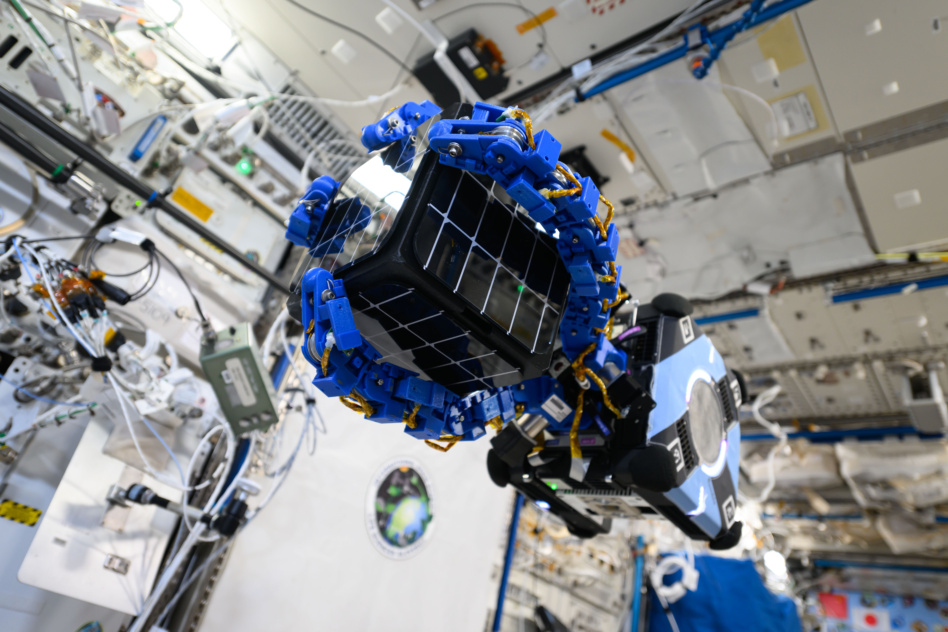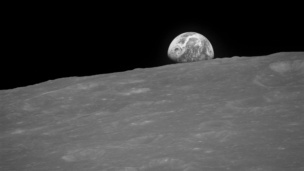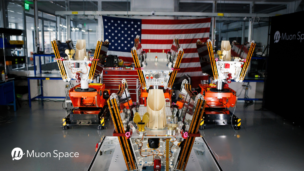Kall Morris Inc., a Michigan-based debris removal startup, successfully demonstrated the capture of an uncontrolled object in space during a mission aboard the ISS.
During the mission, which launched in November, the company’s Responsive Engaging Arms for Captive Care and Handling, or REACCH, would get multiple attempts over four sessions to grasp objects in microgravity aboard the ISS—but the startup achieved that goal in just the first session.
“We had significantly more success in that [first] session than we had actually planned for, and so we started having to get a little off book and started moving into the objectives we had planned for future sessions,” KMI’s cofounder Austin Morris told Payload.
Passing the test: The REACCH system on board the ISS consists of four tentacle-like arms, each about 1.5 ft long, which unfurl to grasp onto inactive and uncontrolled objects. The system also comes with a centralized push rod that provides a counter force to lock the object in place.
For the demonstrations, REACCH was attached to Astrobee, a free-flying robot built to handle autonomous tasks and assist with research aboard the ISS. REACCH is by far the largest and most power-draining system Astrobee has ever worked with, yet the pairing worked seamlessly, according to Morris.
- In the first two demos, REACCH was able to capture a dummy cube fitted with acrylic and aluminum faceplates to mimic solar panels and rocket bodies, respectively. KMI worked with astronaut Suni Williams to experiment with different angles of approach, aiming to test the limits of the tech.
- In the final two tests, scheduled for February, the team will confirm the repeatability of early tests and study how REACCH performs with other materials, including crumpled aluminum and multi-layer insulation.
Graduating to orbit: The next test will be grabbing real pieces of debris on-orbit outside the ISS. This will be a mission for KMI’s flagship spacecraft, Laelaps, which could launch as early as 2027.
Laelaps will have a REACCH system that’s about 25% larger than the demo version used on the ISS. It will navigate the orbital freeways using an electric propulsion system provided by Orbion Space Technology, another Michigan-based startup.
Towing spacecraft of various sizes makes Laelaps’ lifespan hard to predict, but KMI expects each spacecraft will perform up to four grapple and relocation maneuvers in a single mission. It will also be able handle hardware crafted from a wide variety of materials.
What’s next: While the ISS trial runs have demonstrated the tech’s promise, the company has fielded concerns about its commercial viability since its founding. Don Kessler—namesake of the Kessler Syndrome—warned KMI early on that though the physics are possible, the financials don’t make sense.
However, conversations with potential customers reveal that the tech offers an attractive solution to extend the lifespans of satellites that would otherwise deorbit prematurely to avoid running out of fuel on orbit.
“As a third party, end-of-life service provider, that risk equation changes. Now you can run your satellite until it breaks,” cofounder Adam Kall said. “This is no longer [a question of] who’s going to pay for it. The question is, how much are they going to pay?”
Future missions could involve Laelaps pushing multiple customer satellites to deorbit trajectories, then if there’s enough juice in the tank, grabbing an errant piece of debris to bring home on its final descent.





